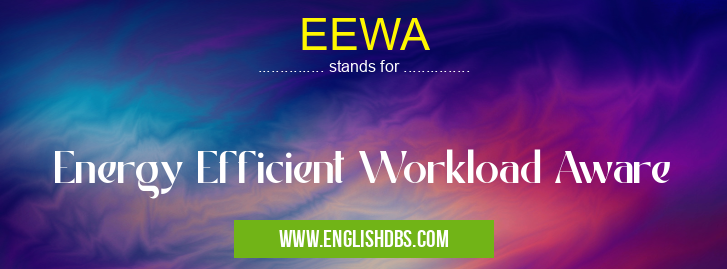What does EEWA mean in ENERGY
EEWA is an abbreviation for "Energy Efficient Workload Aware", a term used to describe technologies and practices for optimizing the energy consumption of computing systems. EEWA focuses on understanding how workloads interact with the underlying hardware, enabling efficient computing resources to be allocated to specific tasks, while at the same time conserving energy and reducing environmental waste.

EEWA meaning in Energy in Governmental
EEWA mostly used in an acronym Energy in Category Governmental that means Energy Efficient Workload Aware
Shorthand: EEWA,
Full Form: Energy Efficient Workload Aware
For more information of "Energy Efficient Workload Aware", see the section below.
» Governmental » Energy
Essential Questions and Answers on Energy Efficient Workload Aware in "GOVERNMENTAL»ENERGY"
What is Energy Efficient Workload Aware technology?
Energy Efficient Workload Aware (EEWA) is a combination of technologies and practices used to optimize energy consumption of computing systems. It involves understanding how workloads interact with underlying hardware, enabling efficient allocation of computing resources to specific tasks while conserving energy and reducing environmental waste.
How does EEWA improve energy efficiency?
By allocating only the necessary resources for each task, EEWA reduces wastage by ensuring that resources are not dedicated to processes which are not actively being used. This helps reduce energy consumption from servers and other equipment as they will not be powering idle components unnecessarily.
What types of systems benefit from using EEWA?
Any type of system can benefit from developing an Energy Efficient Workload Aware strategy but it is most beneficial in large-scale enterprise systems where complex workloads need to be managed efficiently. Examples include cloud computing environments, data centers and High Performance Computing (HPC) systems.
Is there any risk involved in using this technology?
As with any new technology there is some risk involved as it can be difficult to anticipate how certain changes might impact operations or performance levels. However, due to its focus on efficient resource utilization, implementing an Energy Efficient Workload Aware strategy should overall reduce risk for organizations by improving system stability and reliability through more effective resource management.
Are there any best practices for implementing an EEWA strategy?
Yes, best practices for implementing an Energy-Efficient Workload Aware strategy include monitoring power usage regularly; conducting audits of current resource utilization; utilizing tools such as Advanced Power Management (APM) software; and employing forecasts that utilize predictive analytics. Additionally, it is also important to use tools such as automation in order to maximize efficiency gains across larger scale systems.
Final Words:
Applying the principles of Energy-Efficient Workload Aware technology enables organizations to balance IT costs with environmental responsibility while improving system performance at the same time. When implemented correctly these strategies can provide significant cost savings while preserving a healthy environment in the long run.
